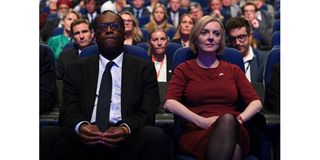More racial and gender diversity in UK’s new government

British Prime Minister Liz Truss and Chancellor of the Exchequer Kwasi Kwarteng attend the annual Conservative Party conference, in Birmingham, Britain on Oct 2, 2022.
What you need to know:
- Liz Truss became the country’s third woman prime minister, and the three top cabinet posts she filled went to ethnic-minority Britons.
- Thus, for the first time, a white man will not lead one of the UK’s four most important ministries of state.
- Ms Truss appointed Mr Kwarteng, whose parents came to Britain from Ghana in the 1960s, as Chancellor of the Exchequer (finance minister).
In sporting terminology, it was an unforced error or an own goal.
However, the result was not the loss of a few points but turmoil in the financial markets, cascading confidence in the government and eventually a humiliating row-back to restore some measure of stability.
In his first budget under new Prime Minister Liz Truss, the Chancellor of the Exchequer, Kwasi Kwarteng, announced a lowering of the tax levied on the wealthy, along with the prospect of cuts in public spending and benefits.
Appalled MPs, including many from the ruling Tory party, said the package was unfair, counter to traditional Conservative thinking and would never get through Parliament.
Soaring prices
Cutting tax for rich people when ordinary folk were suffering from soaring prices was, MPs said, “a display of the wrong values.”
After 11 days of denunciations from financiers as well as politicians, Mr Kwarteng went on air, conceded that “we got this wrong”, and rescinded his decision.
To sighs of relief all around, the pound bounced back from the record low of $1.03 against the dollar, which it hit after the original announcement, and markets steadied.
It was one of the greatest U-turns in modern politics and Ms Truss admitted “we should have laid the ground better”.
However, speculation increased as to her own future following a survey which gave Sir Keir Starmer’s Labour party a 33-point lead over the Conservatives.
That Conservative MPs faced the possible loss of their seats in a future election was deeply ironic since it was not the MPs who voted for Ms Truss as Prime Minister (they mostly went for ex-Chancellor Rishi Sunak) but Conservative party members in the country.
* * *
A unique aspect of Britain’s new government, which went largely unnoticed amidst the turmoil that followed Mr Kwarteng’s financial baptism of fire, is its diversity at the highest level.
Liz Truss became the country’s third woman prime minister, and the three top cabinet posts she filled went to ethnic-minority Britons.
Thus, for the first time, a white man will not lead one of the UK’s four most important ministries of state.
Ms Truss appointed Mr Kwarteng, whose parents came to Britain from Ghana in the 1960s, as Chancellor of the Exchequer (finance minister); James Cleverly, whose mother hails from Sierra Leone and whose father is white, as foreign minister; and Suella Braverman, with parents from Kenya and Mauritius, as home secretary (interior minister).
Until a few years ago, British governments have been mostly made up of white men. It was 2002 when the country got its first non-white cabinet member, Paul Boateng.
Rishi Sunak, whose parents came to Britain from India via East Africa, was Kwarteng’s predecessor, and Priti Patel held the interior portfolio before Ms Braverman.
“The pace of change is extraordinary,” Sunder Katwala told the BBC.
Katwala, director of the think tank, British Future, which focuses on migration and identity, added that “Politics has set the pace.”
However, despite a diversity campaign by the Conservative party, only a quarter of its MPs are women and just six per cent are from non-white backgrounds.
And the upper ranks of Britain’s judiciary, the civil service and the military are still mostly white.
* * *
I wouldn’t say the British are a nation of hypochondriacs, but the newspapers are always ready to publish items about staying well and living longer.
The latest couple involved tea and exercise.
A survey by the University of Glasgow found that just half an hour of brisk walking a day can cut the risk of heart failure. People doing 150 to 300 minutes per week of moderate exercise have a 63 per cent lower risk than the inactive, researchers found.
An American study of British habits discovered that drinking English breakfast tea reduces the risk of dying young.
Those who had two or more cups a day were found to have a nine to 11 per cent lower risk than non-tea drinkers.
* * *
A lady went to the post office to buy stamps for her Christmas cards.
“What denomination?” the assistant asked.
“Oh dear,” said the lady, “how sad that we Christians still all separate! Very well, gave me ten Catholic, ten Methodist and ten Anglican.”
After his Sunday sermon, the preacher said, “Next week I will preach on lying. Please prepare by reading chapter 17 of Mark’s Gospel.”
The following week, he asked his congregation, “How many of you read Mark chapter 17, as I asked?”
A forest of hands shot up. ”
Said the preacher, “There are only 16 chapters in Mark’s Gospel. Here is my sermon on lying.”
A blameless priest and an alcoholic taxi driver died and went to heaven, where the cab driver was given a palatial villa and the priest a shabby log cabin.
Seeing the priest’s wounded look, St Peter said, “When you preached, everyone slept. When he drove, everyone prayed.”





